一.赋值运算符重载
1.运算符重载


(.*) (::) (sizeof) (?:) (.)这五个运算符都是不能进行重载的
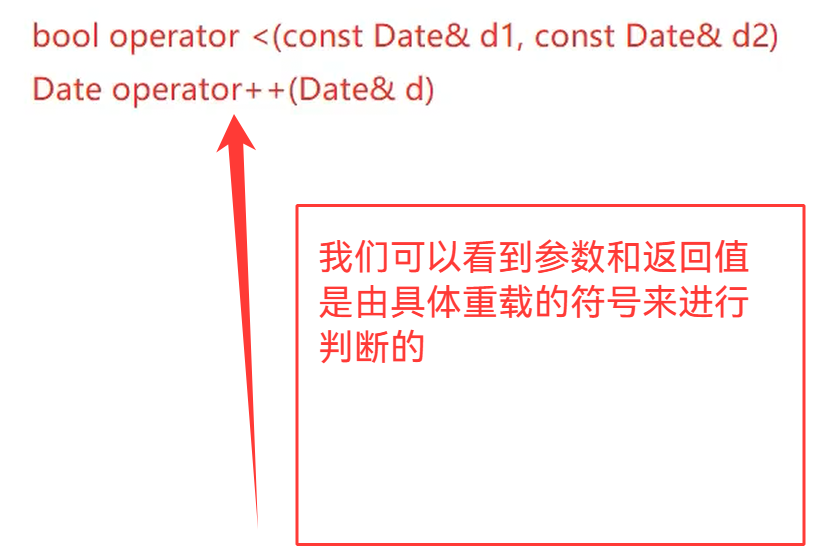
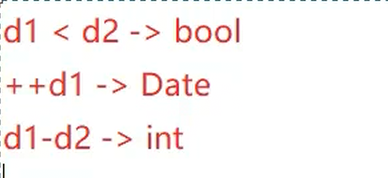
.*运算符的解释
cpp
#include<iostream>
using namespace std;
class OB
{
public:
void func()
{
cout << "void func()" << endl;
}
};
typedef void(OB::*PtrFunc)() ;//成员函数指针类型
int main()
{
// 函数指针
// void (*ptr)();
// 成员函数要加&才能取到函数指针
PtrFunc fp = &OB::func;//定义成员函数指针p指向函数func
//普通函数,函数名就是这个函数的地址,如果是类内的函数,那么规定要加一个&
OB temp;//定义ob类对象temp
(temp.*fp)();
return 0;
}就像是类中通过.来取出函数的地址的地址,在通过*进行解引用
== 运算符重载:
cpp
class Date
{
public:
Date(int year = 1900, int month = 1, int day = 1)
{
_year = year;
_month = month;
_day = day;
}
int GetYear()
{
return _year;
}
//private:
int _year;
int _month;
int _day;
};
// 重载成全局,无法访问私有成员
// 1、提供这些成员get和set
// 2、友元 后面会讲
// 3、重载为成员函数(一般使用这种)
bool operator==(const Date& d1, const Date& d2)
{
return d1._year == d2._year
&& d1._month == d2._month
&& d1._day == d2._day;
}
//d1-d2
//d1+d2 没有意义
//d1*d2 没有意义
//一个类要重载哪些运算符是看需求,看重载有没有价值和意义
int main()
{
Date d3(2024, 4, 14);
Date d4(2024, 4, 15);
// 显式调用
operator==(d3, d4);
// 直接写,装换调用,编译会转换成operator==(d3, d4);
d3 == d4;
return 0;
}d1-d2
d1+d2 没有意义
d1*d2 没有意义
一个类要重载哪些运算符是看需求,看重载有没有价值和意义
上面的代码,我们可以看到,成员变量如果是private的话,我们重载,无法直接使用成员变量,我们有以下三种方法:
重载成全局,无法访问私有成员
1、提供这些成员get和set
2、友元 后面会讲
3、重载为成员函数(一般使用这种)
以下是重载成成员函数:(非全局的重载)
cpp
class Date
{
public:
Date(int year = 1900, int month = 1, int day = 1)
{
_year = year;
_month = month;
_day = day;
}
//// d3.Func(d4);
//bool Func(const Date& d)
//{
// return this->_year == d._year
// && this->_month == d._month
// && this->_day == d._day;
//}
// d3.operator==(d4);
bool operator==(const Date& d)
{
return this->_year == d._year
&& this->_month == d._month
&& this->_day == d._day;
}
private:
int _year;
int _month;
int _day;
};
int main()
{
Date d3(2024, 4, 14);
Date d4(2024, 4, 15);
// 显式调用
d3.operator==(d4);
// 转换调用 等价于d3.operator==(d4);
d3 == d4;
int i = 0, j = 1;
bool ret = i == j;
return 0;
}


如果全局的和类内的同时存在,那么我们会调用哪一个?
优先调用类内部的,全局的不会去调用
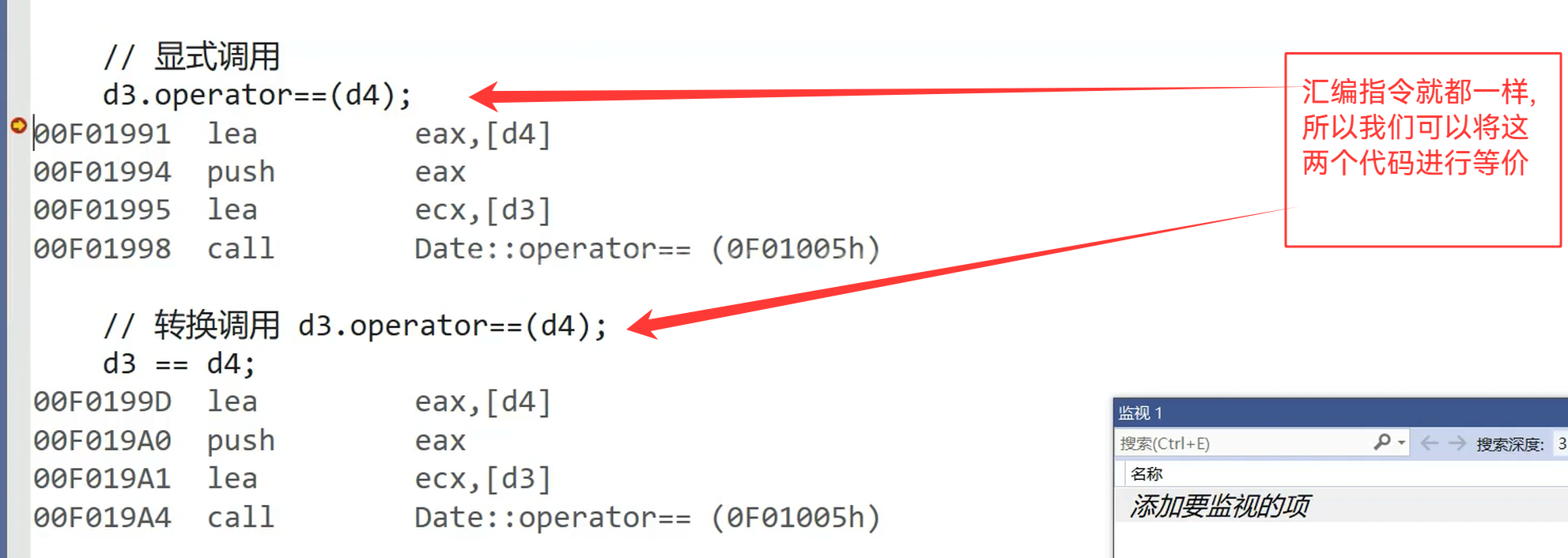
如果是d3.operator==(d4),那么this指针指向的就是d3
2.赋值运算符重载
1. 赋值运算符重载格式

拷贝构造和赋值拷贝的区别:


cpp
void operator=(const Date& d)
{
_year = d._year;
_month = d._month;
_day = d._day;
}赋值重载这样写就行了吗?

像这种连续赋值就不行了
d4先赋值给d2 , d2作为返回值再赋值给d1( 赋值表达式的返回值是左操作数 ,所以我们要进行返回参数)
我们想拿到d2,d2作为前面的this指针,所以我们直接返回this指针
所以我们会有下面两种写法,一种是返回*this的拷贝,另一种是返回*this的引用(我们可以看看两者有什么差别)
cpp
Date operator=(const Date& d)
{
_year = d._year;
_month = d._month;
_day = d._day;
return *this;
}
cpp
Date& operator=(const Date& d)
{
_year = d._year;
_month = d._month;
_day = d._day;
return *this;
}为了更好的看到差别,我们将代码贴出来:
cpp
"拷贝构造"
Date(const Date& d)
{
cout << "Date(const Date& d)" << endl;
_year = d._year;
_month = d._month;
_day = d._day;
}下面是引用和传值做返回值的案例:
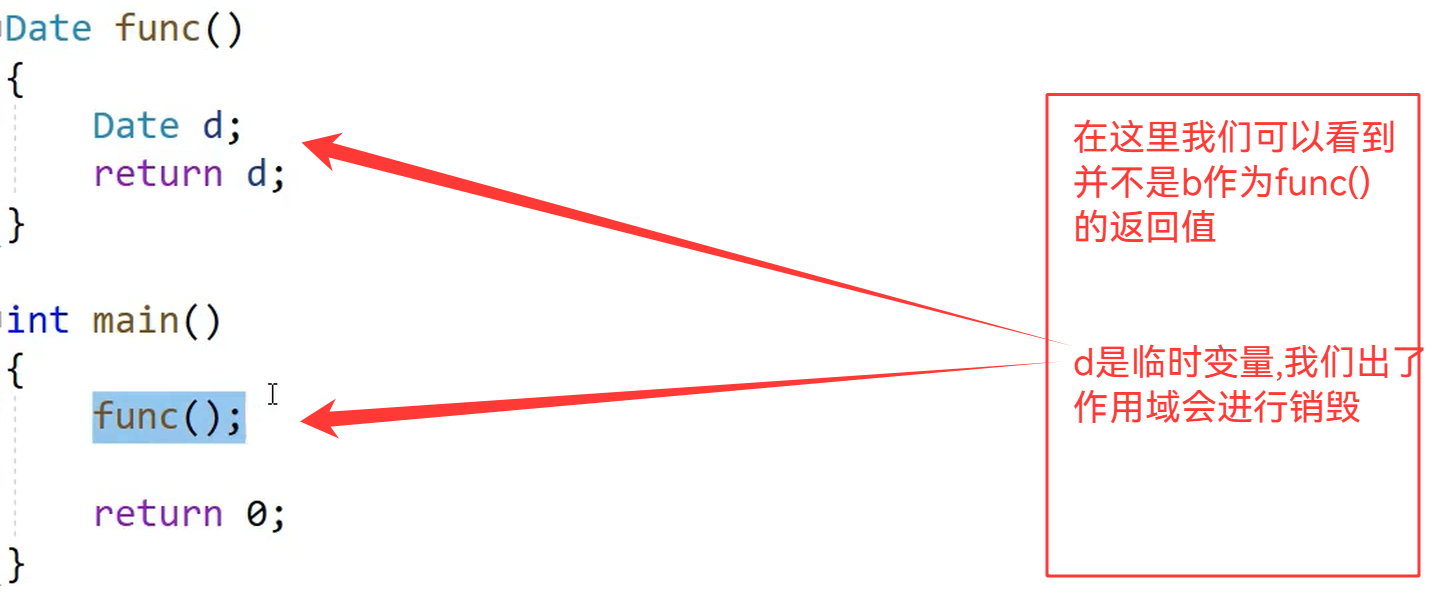

d的拷贝会作为返回值,传递给func()作为返回值,所以会进行拷贝
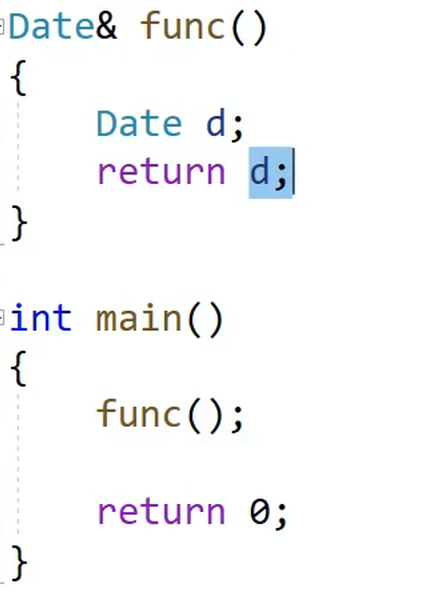
现在以Date&作为返回值,所以不会发生拷贝(但是会有一个问题,d是临时变量,出了作用域就析构了,所以返回的是一个异常的地址)
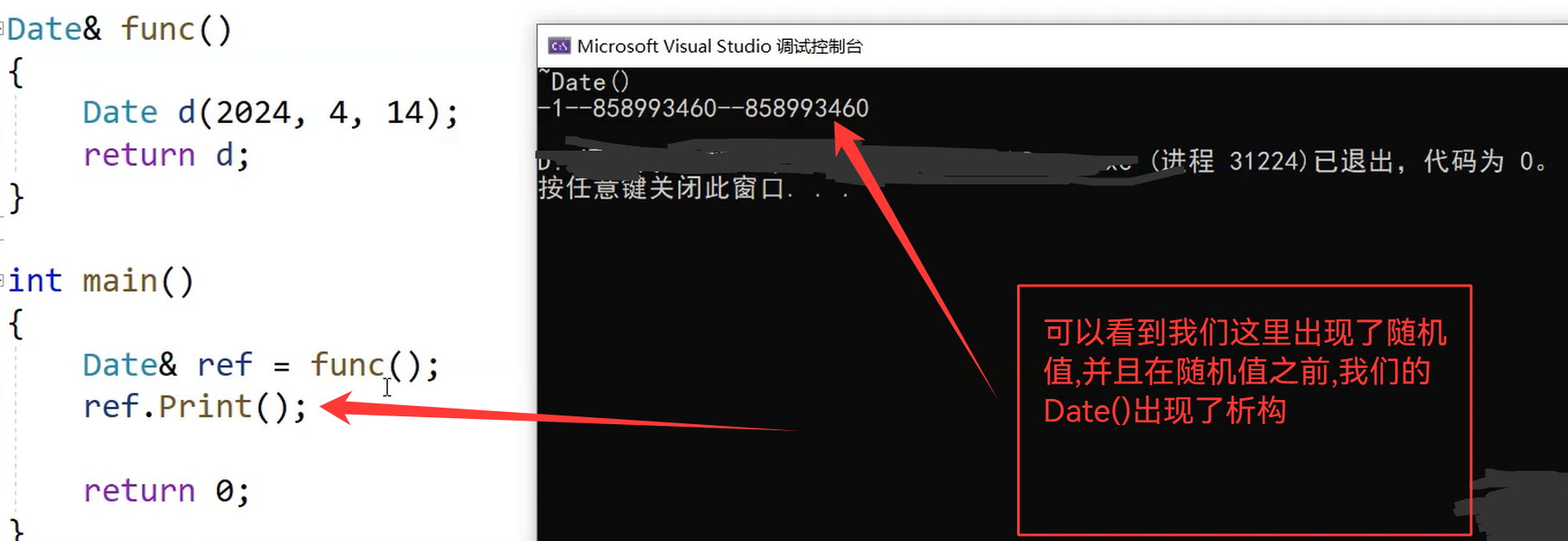
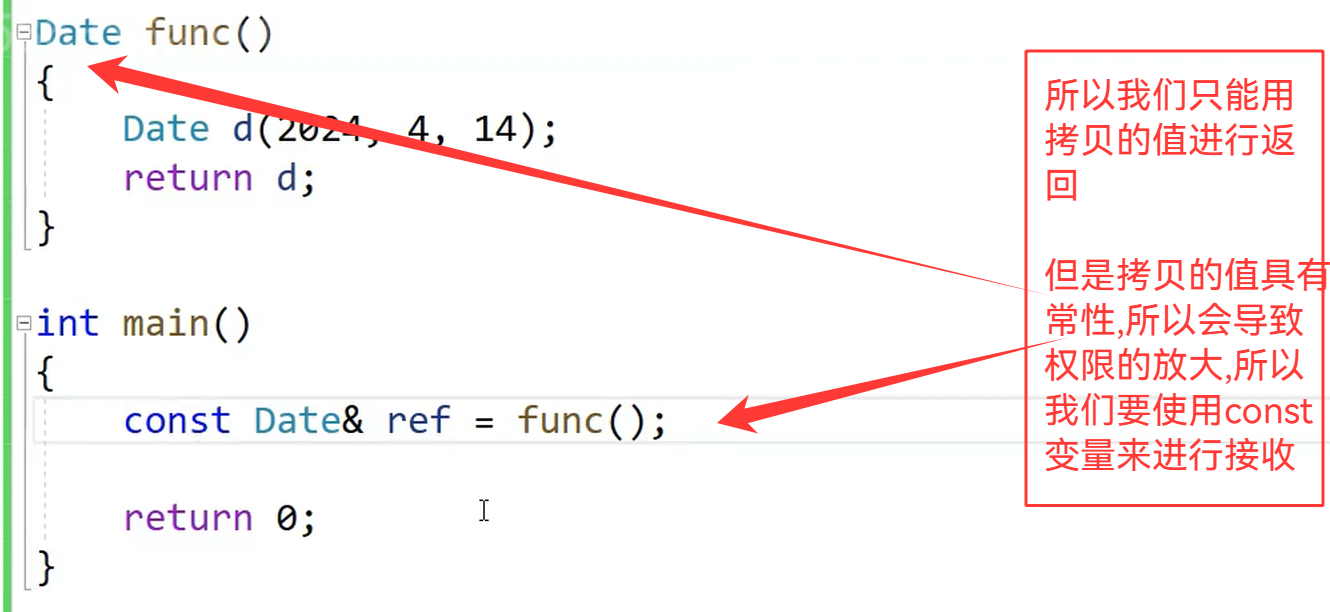
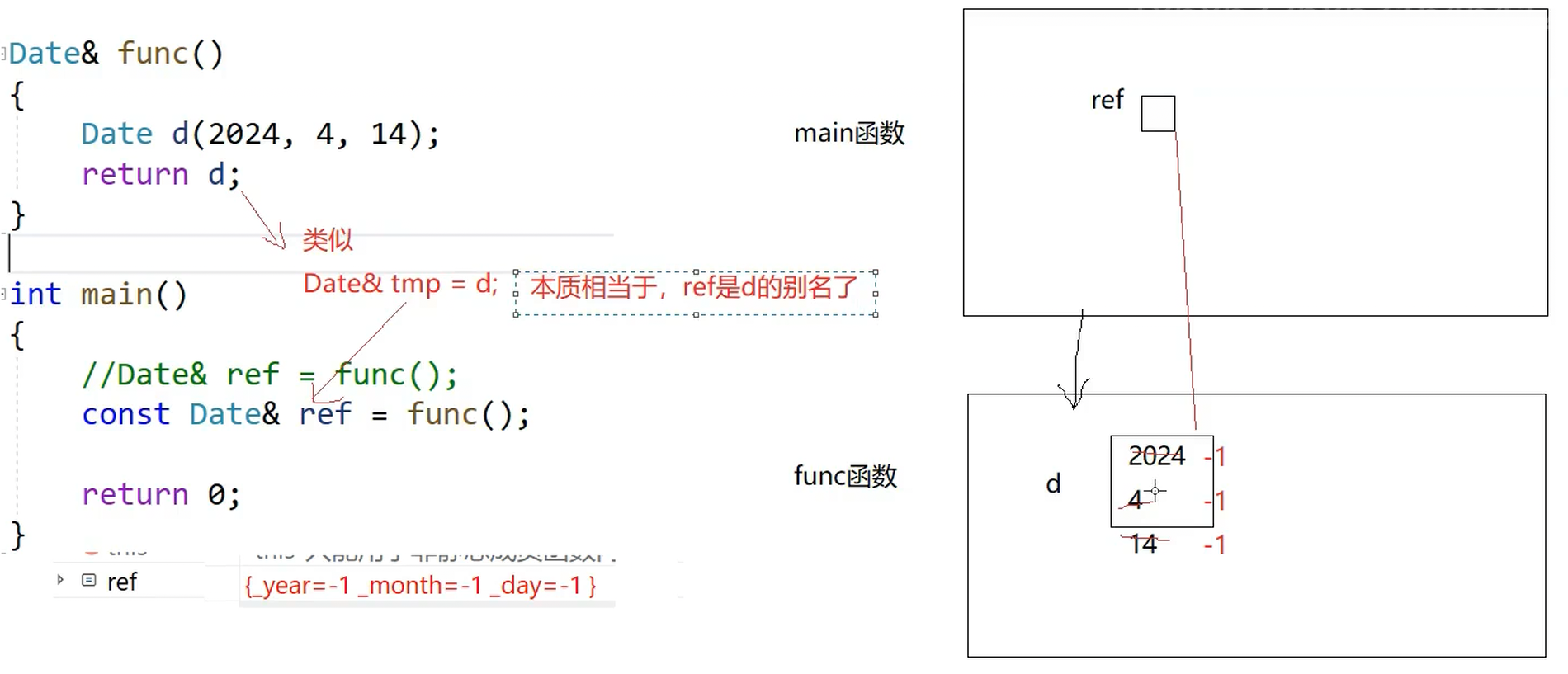
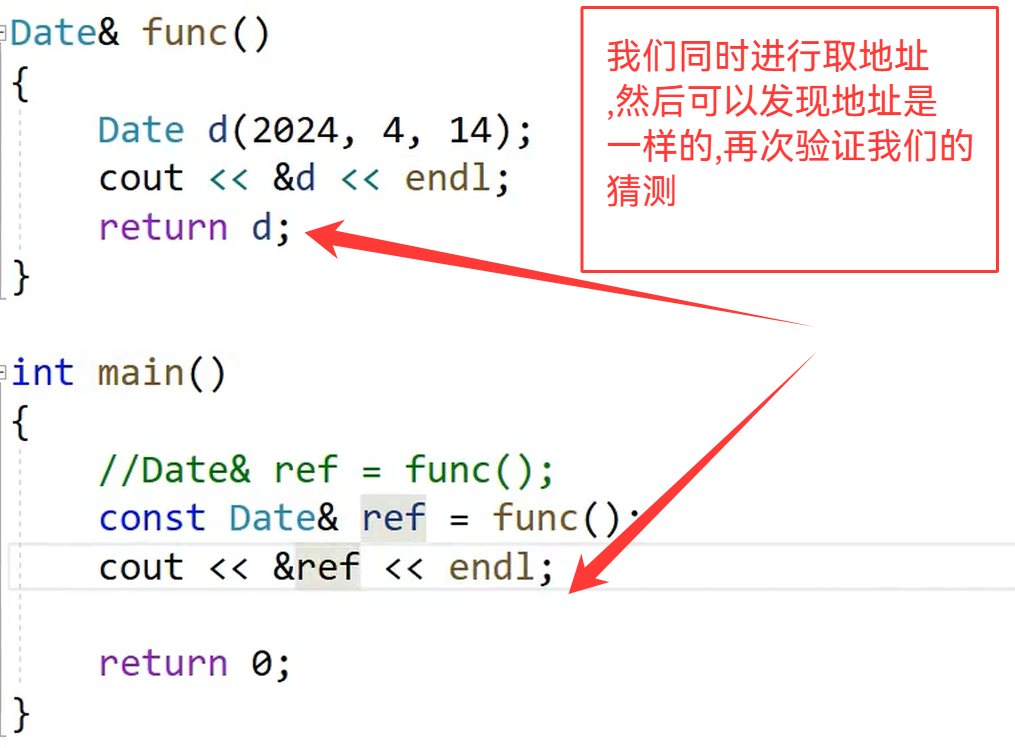
这样ref就相当于是野指针的东西了

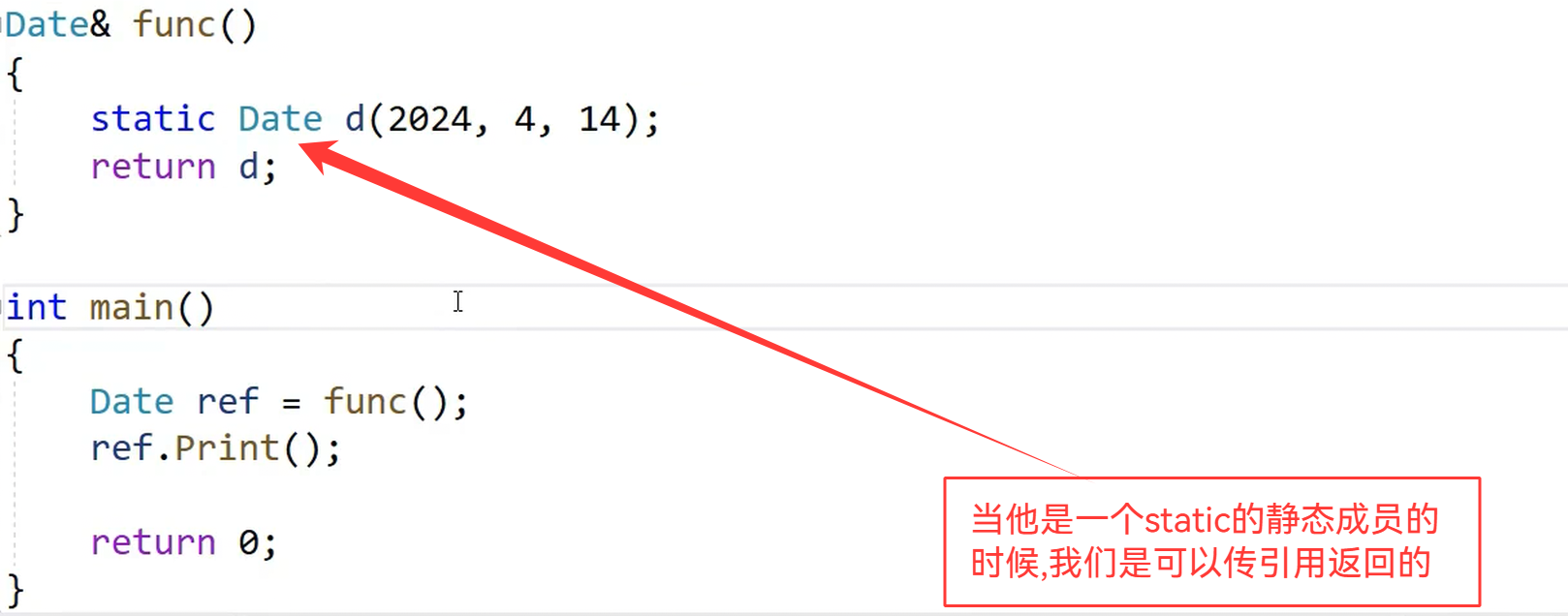


回到刚刚的问题上面来:
所以我们是推荐传引用返回的,this出了作用域还是存在的,所以通过传引用来减少拷贝
cpp
Date& operator=(const Date& d)
{
_year = d._year;
_month = d._month;
_day = d._day;
return *this;
}但是我们思考一下,这个重载运算符代码写的对吗?

不排除有人会这样写代码(这样就会导致赋值的时候白赋值了)
所以我们为了防止这样,代码可以这么写:
cpp
Date& operator=(const Date& d)
{
if (this != &d)
{
_year = d._year;
_month = d._month;
_day = d._day;
}
return *this;
}2.赋值运算符只能重载成类的成员函数不能重载成全局函数

简单理解就是规定
3. 用户没有显式实现时,编译器会生成一个默认赋值运算符重载,以值的方式逐字节拷贝。注 意:内置类型成员变量是直接赋值的,而自定义类型成员变量需要调用对应类的赋值运算符 重载完成赋值。

插播补充知识:在类里面,不声明默认是内联函数,但是声明和定义分离就不是内联函数了
3.前置++和后置++重载
cpp
class Date
{
public:
// 构造函数
Date(int year = 1900, int month = 1, int day = 1)
{
_year = year;
_month = month;
_day = day;
}
// 前置++:返回+1之后的结果
// 注意:this指向的对象函数结束后不会销毁,故以引用方式返回提高效率
Date& operator++()
{
_day += 1;
return *this;
}
// 后置++:
// 前置++和后置++都是一元运算符,为了让前置++与后置++形成能正确重载
// C++规定:后置++重载时多增加一个int类型的参数,但调用函数时该参数不用传递,编译器自动传递
// 注意:后置++是先使用后+1,因此需要返回+1之前的旧值,故需在实现时需要先将this保存一份,然后给this+1
// 而temp是临时对象,因此只能以值的方式返回,不能返回引用
Date operator++(int)
{
Date temp(*this);
_day += 1;
return temp;
}
private:
int _year;
int _month;
int _day;
};
int main()
{
Date d;
Date d1(2022, 1, 13);
d = d1++; // d: 2022,1,13 d1:2022,1,14
d = ++d1; // d: 2022,1,15 d1:2022,1,15
return 0;
}二.Date类的实现
cpp
"Date.cpp"
#include"Date.h"
Date::Date(int year, int month, int day)
{
_year = year;
_month = month;
_day = day;
}
void Date::Print()
{
cout << _year << "-" << _month << "-" << _day << endl;
}
// d1 < d2
bool Date::operator<(const Date& d)
{
if (_year < d._year)
{
return true;
}
else if (_year == d._year)
{
if (_month < d._month)
{
return true;
}
else if (_month == d._month)
{
return _day < d._day;
}
}
return false;
}
// d1 <= d2
bool Date::operator<=(const Date& d)
{
return *this < d || *this == d;
}
bool Date::operator>(const Date& d)
{
return !(*this <= d);
}
bool Date::operator>=(const Date& d)
{
return !(*this < d);
}
bool Date::operator==(const Date& d)
{
return _year == d._year
&& _month == d._month
&& _day == d._day;
}
bool Date::operator!=(const Date& d)
{
return !(*this == d);
}
// d1 += 50
Date& Date::operator+=(int day)
{
_day += day;
while (_day > GetMonthDay(_year, _month))
{
_day -= GetMonthDay(_year, _month);
++_month;
if (_month == 13)
{
++_year;
_month = 1;
}
}
return *this;
}
// d1 + 50
//Date Date::operator+(int day)
//{
// Date tmp = *this;
// tmp._day += day;
// while (tmp._day > GetMonthDay(tmp._year, tmp._month))
// {
// tmp._day -= GetMonthDay(tmp._year, tmp._month);
// ++tmp._month;
// if (tmp._month == 13)
// {
// ++tmp._year;
// tmp._month = 1;
// }
// }
//
// return tmp;
//}
Date Date::operator+(int day)
{
Date tmp = *this;
tmp += day;
return tmp;
}
cpp
"Date.h"
#pragma once
#include<iostream>
using namespace std;
#include<assert.h>
class Date
{
public:
Date(int year = 1900, int month = 1, int day = 1);
void Print();
// 直接定义类里面,他默认是inline
// 频繁调用
int GetMonthDay(int year, int month)
{
assert(month > 0 && month < 13);
static int monthDayArray[13] = { -1, 31, 28, 31, 30, 31, 30, 31, 31, 30, 31, 30, 31 };
// 365天 5h +
if (month == 2 && (year % 4 == 0 && year % 100 != 0) || (year % 400 == 0))
{
return 29;
}
else
{
return monthDayArray[month];
}
}
bool operator<(const Date& d);
bool operator<=(const Date& d);
bool operator>(const Date& d);
bool operator>=(const Date& d);
bool operator==(const Date& d);
bool operator!=(const Date& d);
// d1 + 100
Date& operator+=(int day);
Date operator+(int day);
Date& operator-=(int day);
private:
int _year;
int _month;
int _day;
};
cpp
"test.cpp"
#include"Date.h"
int main()
{
Date d1(2024, 4, 14);
Date d2 = d1 + 50;
d1.Print();
d2.Print();
return 0;
}